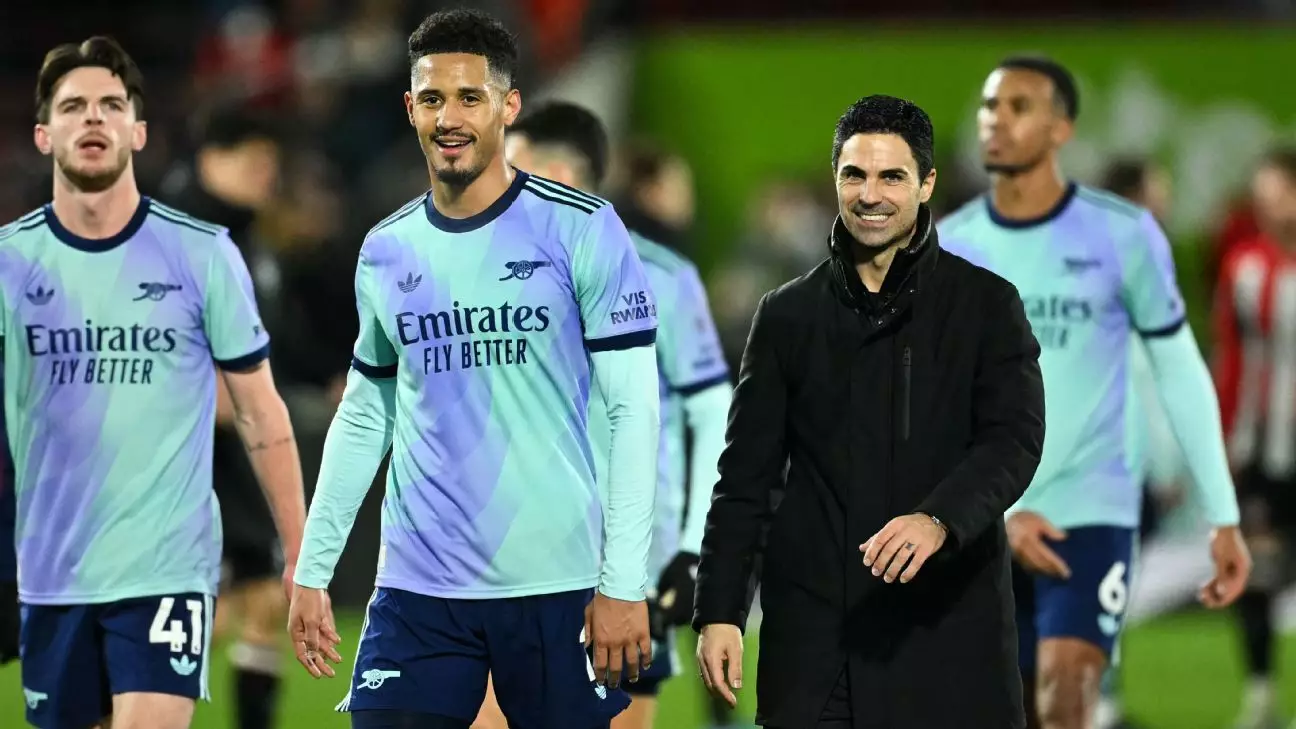As the Premier League season accelerates into a pivotal January, Arsenal faces the crucial question of squad depth and its implications for their title aspirations. With key players absent and new tactical decisions on the horizon, the Gunners must evaluate whether they have the attacking prowess necessary to challenge for major honors.
The recent absence of Bukayo Saka due to hamstring surgery forces Arsenal to recalibrate their attacking strategies. Saka, celebrated for his consistency and creativity, leaves a significant void, prompting Manager Mikel Arteta to give teenager Ethan Nwaneri the opportunity to start in his place. Nwaneri’s performance against Brentford showcased maturity that belied his age, contributing to the Gunners’ comeback from an early deficit. However, can a fresh face like Nwaneri genuinely fill the shoes left by an established star? This question underscores the critical need for effective youth integration within the squad, tempered by the harsh realities of top-flight expectations.
Although it is encouraging that both Gabriel Jesus and Gabriel Martinelli have found form recently, scoring vital goals to secure a 3-1 victory against Brentford, the depth of Arsenal’s attack remains a concern. A burgeoning understanding between these forward players is promising, but it raises further debate on whether this attacking line can sustain consistent high-level performances, especially amid the rigors of a demanding fixture schedule.
A Shifting Transfer Landscape
Arsenal’s struggles against top European clubs last season indicated a pressing need to strengthen their attack, particularly during the winter transfer window. Following their UEFA Champions League quarterfinal exit at the hands of Bayern Munich, club officials identified gaps in their offensive options, particularly the necessity for either a winger or a central striker. Despite the interest in promising talents such as Benjamin Sesko from RB Leipzig, Arsenal’s reluctance to move during the summer transfer period raises questions about their ambition and strategic planning.
As Liverpool continues to string together impressive performances at the top of the table, the urgency for Arsenal to bolster their ranks intensifies. Supporters are divided on the ideal tactical solution—some argue for a dynamic winger to increase attacking width, while others point to the essential need for a clinical finisher. Although the team’s recent exploits against Brentford provide a temporary relief from pressure, the murmurs for reinforcements are inevitable, given the heightened competition in the league.
Building Resilience and Depth
Arsenal’s resilience was evident during their comeback win in which they showcased their ability to recover from adversity. After conceding a goal early in the match, the Gunners rallied, demonstrating the mental fortitude and tactical flexibility essential for any title-contending side. Players like Martinelli and Jesus, who are hitting their stride, will be crucial for sustaining momentum as they seek to minimize the impact of injuries to pivotal players like Saka and Kai Havertz.
Arteta’s squad rotation strategy will also come under scrutiny as matches pile up in the congested schedule. Besides relying on established stars, the integration of talented youngsters like Nwaneri can provide an unexpected boost while managing the workload of the more experienced players. It’s clear that the evolution of this team will hinge on striking a balance between giving youth opportunities and ensuring that seasoned players take the lead in high-stakes scenarios.
As Arsenal navigate this critical juncture of the season, the question remains: should they invest in additional attacking talent this January, or trust the existing squad to overcome their shortcomings? Arteta’s optimism about the current group, stating that the willingness and versatility in the squad are satisfactory, reflects confidence that could mitigate immediate transfer market actions. However, should injuries strike again or performances dip, the gamble on in-house resources will be put to the ultimate test.
Moreover, managing expectations becomes pivotal for both the players and supporters alike. The organization’s aspirations for major titles, as highlighted by Arteta, indicate a desire for progression beyond mere participation in a title race. The pressure to deliver tangible success is palpable, and how the club addresses both squad depth and player development will determine if they can turn potential into performance.
Arsenal is at a crossroads. Balancing aspirations with realities demands sharp, strategic decision-making both on and off the pitch. Whether through tactical ingenuity or recruitment in the upcoming transfer window, the Gunners must strive to forge a path that will lead them to success, transforming their promising potential into championship-worthy performance in the Premier League.

